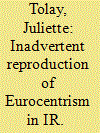| Srl | Item |
| 1 |
ID:
144061


|
|
|
|
|
| Summary/Abstract |
The role of Eurocentrism in International Relations (IR) has become a focal point for critical scholarship. However, anti-Eurocentric scholars tend to overlook the extent to which Eurocentrism is a tempo-spatial phenomenon whose roots and development need to be analysed in a way that takes its internal differences into account. This article rejects a single notion of Eurocentrism, proposing instead to understand Eurocentrism through its three forms: historical-contextual, ideological, and residual. This differentiation can provide a means for dealing with the challenges of Eurocentrism in a more self-reflexive manner without seeing it as omnipresent and unchanging. It also offers to approach Eurocentric IR from a perspective that considers the role of historiographical differences in understanding the rise of European powers. This means that IR cannot base its explanatory frameworks on a single (the) historical record. Understanding the limits of Eurocentrism and of anti-Eurocentrism provides a better means for dealing with the formerʼs problematic impact on IR scholarship.
|
|
|
|
|
|
|
|
|
|
|
|
|
|
|
|
| 2 |
ID:
183223


|
|
|
|
|
| Summary/Abstract |
The study of Eurocentrism has become a hallmark of postcolonial International Relations theories. Of particular concern in this literature has been the resilience of Eurocentrism despite conscious efforts to move towards a post-Eurocentric understanding of world politics. This study argues that while existing works have highlighted many of the reasons why Eurocentrism persists today, it has not been sufficiently identified and conceptualised. In particular, why some policy actors, who have a vested interest in moving beyond Eurocentrism, inadvertently reproduce Eurocentrism? This article proposes to distinguish between different types of inadvertent reproductions. In particular it highlights rhetorical critique, deconstruction, decentring and dehierarchising, as different ways to critique, inadvertently reproduce and partially modify Eurocentrism. To illustrate this situation, this article looks at Turkey's migration policies and documents how Turkish governing elites have openly claimed the need to upend the Eurocentric order, yet have reproduced it in practice.
|
|
|
|
|
|
|
|
|
|
|
|
|
|
|
|